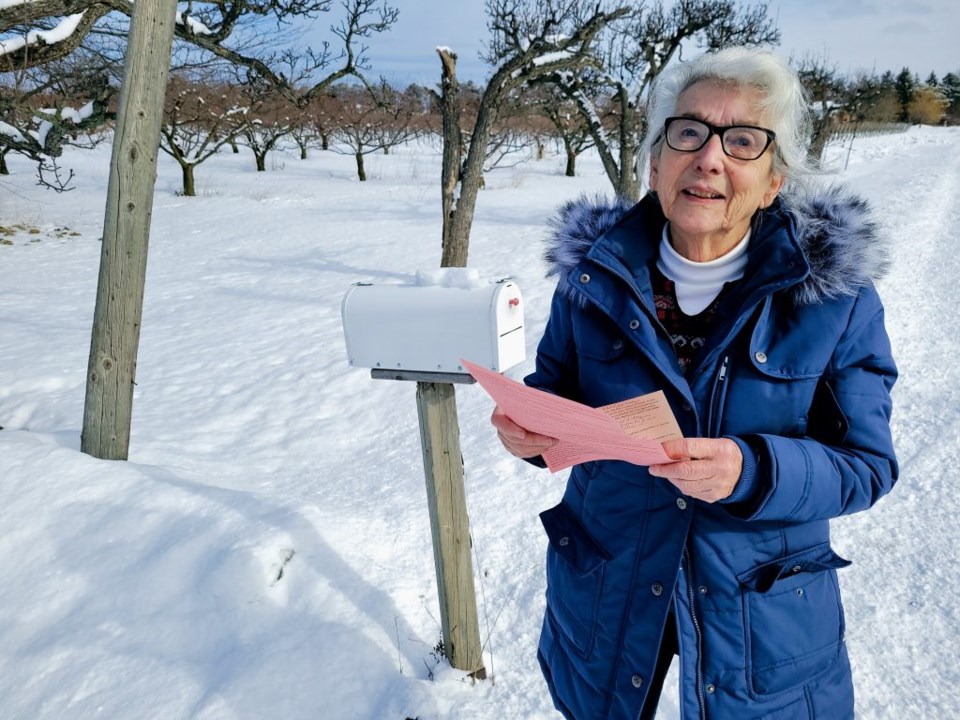
When Cynthia Rand opened her rural mailbox last week and discovered a religious tract that attacks vaccinations, and just about everything else associated about the COVID pandemic, she was concerned.
It wasn’t distributed through Canada Post — someone has driven the rural roads to deliver them by hand.
There were two and a half double-sided pages of closely packed, really tiny type that made it difficult to read, but she took the time to read through them.
“There are most certainly untrue items, and inaccuracies,” she says.
She and her husband Peter both have a science background - Peter is a retired professor of biophysics, and Cynthia’s career was as a scientific assistant.
She began by pointing out a portion attacking the mRNA vaccinations that this tract says changes our DNA, an argument we’ve heard before, but this time, it says it’s being done “with the goal of making us trans-human…”
The mRNA in vaccinations has not affected the DNA, she points out— many of the experts we trust have stressed that. “It has acted as an intermediary as a defence against the virus.”
Another piece of popular misinformation it contains: ”Surely by now you can see all 190 nations in coordinated lock step aggressively taking draconian actions against what appears to be no worse than the yearly flu.”
“Statistics of deaths, hospitalizations, hospital procedure cancellations, would negate that last part,” Cynthia continues.
“I thought I could quote, and refute, other parts of this propaganda; it is muddled nonsense, and I thought it must be counteracted,” she says, which is why she reached out to The Local.
“It is a detailed description of plans to control or eliminate populations. Those who would profit from results of these plans are not specifically named; pharmaceutical investors are implied,” she says. “It is clever. Well-read, educated people, get overwhelmed by the density of its accusations. People not used to examining information flowing at them from all the social media, accept this noxious flow as facts, are angry and feel impotent. Hence a recourse to powerful trucks.”
There is more, some of it very unsettling, including laying out a course it compares to the Holocaust, with those who survive being put in COVID camps, to be re-educated and lose control of their property, never to return.
There is far, far more, but Cynthia fears repeating it is akin to spreading misinformation and giving it a legitimacy it doesn’t deserve. “It should be counteracted, but I don’t know how to do that with publicizing it.”
Although she admits to getting angry at such misinformation, and can be aggressive in wanting to pursue it and do something about it, Peter, she says, is more laid back.
This, however, disturbed him as well. He started to read the tract, and gave up, tossing it aside. “There is no value in it, and I think there is danger in it. You can’t counter these arguments even if you wanted to. There is a gap that can’t be crossed. There is no point in discussion — the differences are irreconcilable.”
Social media makes it so easy to draw people in, and spread misinformation so quickly, he added, “it’s a major problem in the world today. The speed with which misinformation can be transmitted is pretty unprecedented. Any group that has something they want to propagate any idea, can find enough people to support it, and to make a lot of noise about it, until it becomes quite a force.”
Peter says he can’t imagine what people would be looking for that would compel them to read the tract. “I’d be surprised if many did read it, and if they did, it would be interesting to know what they took from it, and what their interest is.”
The best way of counteracting this propaganda, says Cynthia, “is to ask people who receive it to read it, carefully, like the small print of a contract, until they can take no more, and then burn it.”